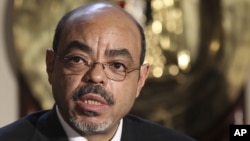A former U.S. Ambassador to Ethiopia says the latest statements by Ethiopian officials suggest “a significant health issue” facing Prime Minister Meles Zenawi.
During a press conference Thursday in Addis Ababa, Ethiopian authorities said Meles has been advised by his physicians to take “sick leave,” and that he will resume his official duties after he recuperates.
David Shinn, who currently teaches international affairs at the George Washington University, says he finds the reported official remarks telling.
“You wouldn’t make a statement like that that is so open-ended unless the problem is significant,” he says.
Conflicting accounts
Shinn notes today’s statement is at variance with earlier remarks by a TPLF party elder.
“There was a comment a couple of days ago by Sebhat Nega, a very close friend of Meles, indicating Meles will be back on the job within a week or so. So I think we’re talking about an open-ended issue,” he says.
The former U.S. Ambassador says Prime Minister Meles seemed in good health when he recently saw him in Washington.
“Prime Minister Meles was in Washington on May 18…I was there during a question and answer session, I did not detect any health issue. He seemed to me perfectly normal at that time,” he recalls.
Shinn says Meles has probably known about his health condition for some time and that this could not have been “some sort of a surprise issue” for him.
Potential succession
That being the case, says the former diplomat, Meles must have given thought who would follow him.
“I would be willing to bet very good money that he has been planning for some way to deal with this issue in order to insure some kind of reasonable succession of government in Ethiopia.”
Commenting on the hypothetical, Shinn outlines a scenario -- should Mr. Meles become incapacitated.
“In the immediate aftermath, you would have the Deputy Prime Minister Haile Mariam Dessalegne taking over, and then it would be up to the House of Peoples’ Representatives at some point to name a replacement Prime Minister,” he says.
Shinn says the success of any potential handover will depend on how well any such transition has been organized, and how long Meles has known (if he is incapacitated) about the need to organize a transition.
The former diplomat says if Meles has known about it for some time, it could be a “relatively smooth transition.”
“I think the way Meles works, he probably has done quite a lot to try to ensure a transition of the EPRDF at least through 2015 (through the next elections.) After that, of course, it may be a whole new ballgame," he says.
During a press conference Thursday in Addis Ababa, Ethiopian authorities said Meles has been advised by his physicians to take “sick leave,” and that he will resume his official duties after he recuperates.
David Shinn, who currently teaches international affairs at the George Washington University, says he finds the reported official remarks telling.
“You wouldn’t make a statement like that that is so open-ended unless the problem is significant,” he says.
Conflicting accounts
Shinn notes today’s statement is at variance with earlier remarks by a TPLF party elder.
“There was a comment a couple of days ago by Sebhat Nega, a very close friend of Meles, indicating Meles will be back on the job within a week or so. So I think we’re talking about an open-ended issue,” he says.
The former U.S. Ambassador says Prime Minister Meles seemed in good health when he recently saw him in Washington.
“Prime Minister Meles was in Washington on May 18…I was there during a question and answer session, I did not detect any health issue. He seemed to me perfectly normal at that time,” he recalls.
Shinn says Meles has probably known about his health condition for some time and that this could not have been “some sort of a surprise issue” for him.
Potential succession
That being the case, says the former diplomat, Meles must have given thought who would follow him.
“I would be willing to bet very good money that he has been planning for some way to deal with this issue in order to insure some kind of reasonable succession of government in Ethiopia.”
Commenting on the hypothetical, Shinn outlines a scenario -- should Mr. Meles become incapacitated.
“In the immediate aftermath, you would have the Deputy Prime Minister Haile Mariam Dessalegne taking over, and then it would be up to the House of Peoples’ Representatives at some point to name a replacement Prime Minister,” he says.
Shinn says the success of any potential handover will depend on how well any such transition has been organized, and how long Meles has known (if he is incapacitated) about the need to organize a transition.
The former diplomat says if Meles has known about it for some time, it could be a “relatively smooth transition.”
“I think the way Meles works, he probably has done quite a lot to try to ensure a transition of the EPRDF at least through 2015 (through the next elections.) After that, of course, it may be a whole new ballgame," he says.





